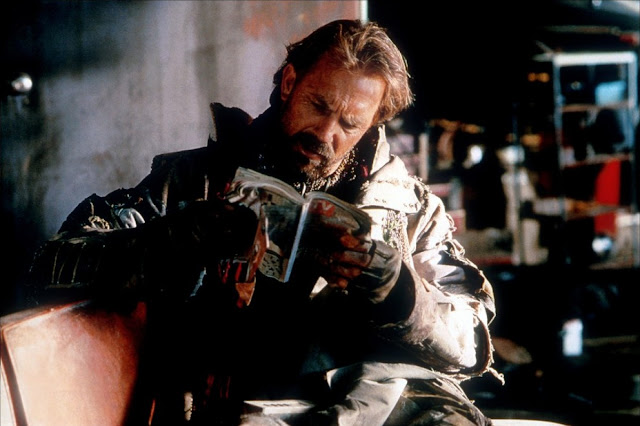Weird Westerns: The Postman (1997)
★★☆☆☆
An overlong post-apocalyptic Western with Kevin Costner battling a warrior cult that honestly seem like they should have Twitter accounts with Pepe AVIs.
by Max Sparber
I like Kevin Costner, and I mean that. He's turned in more than a few genuinely terrific performances, he seems like a thoughtful guy, and he put out an album this year, "Famous for Killing Each Other: Music from and Inspired by Hatfields & Mccoys," that I thought was fascinating.
He's staked out an infrequent claim on Westerns, and has proven to have a taste for ambitious long-form tales of the social cost of frontier violence. He has an epic sensibility, but doesn't always have epic talent to match.
"The Postman," an an example, which is a tale of a post-apocalyptic American that has reverted into something that resembled the Old West, as three-hours long, or thereabouts. And I'm hard-pressed to say why. The scenery is undeniably magnificent, filmed with an eye for some of America's most impressive vistas, but it's not lensed in a painterly way, where we want to just sit back and luxuriate in the image.
What else might make a story epic? Comprehensive world-building might do it, and is needed in an apocalyptic tale. But this film sees the future as a collection of open roads that connect little American hamlets that perhaps looks a little dustier than usual, sometimes with some sandbags set up as though there were a military encampment.
It's no more sophisticated a representation of a post-apocalyptic world than you would find on AMC's "The Walking Dead," but this was a hugely budgeted film, and not a weekly television series. We could fairly expect more onscreen, and have seen it, such as in the "Mad Max" movies, which was one of this film's inspirations.
And it's a pity, as the original novel by David Brin did not scrimp on the worldbuilding. He wrote of a considerably more complicated world, a West of three competing philosophies, with that competition acting to prevent the return of any sort of shared government. There were technocrats, desperately trying to build a working social order around a long-destroyed computer; there was a cult of misogynist warriors who mostly existed to pillage; and there was a group of frontier rebels, including ranchers, loggers, and Native Americans, who are waging a successful war against the warrior cult.
Most of this is gone in the film version, with just the warrior cult remaining, represented by Will Patton as a sort of generic warlord, sitting in his barracks painting and discussing Shakespeare while scheming to leech resources from poorly defended hamlets. By eliminating the frontier rebels from the film, Costner pulls out a lot of what makes the film a Weird Western, and disappointingly eliminates American Indian participation in the story.
Instead, Costner recasts the books titular Postman, played by himself, as a sort of unlikely savior. In the novel, the character mostly serves as a bridge between the competing factions, a man who, because he dressed himself in a postal uniform during frigid weather, becomes seen as a representative of the idea of a newly united America, with a functioning federal government.
The film pushes this idea a lot further, with Costner accidentally inspiring a cult of teenagers who dress in ragged approximations of his costume and actually start delivering mail between the hamlets, making themselves targets of the warlord, eventually forcing Costner's Postman to raise up an army against the warrior cult.
Costner, bless his heart, doesn't have "Mad Max" creators Geroge Miller's punky surrealism, so instead of presenting us with an acid-etched post-apocalyptic wasteland that seem drawn from the wildest pages of 2000 AD, instead seem like the mellow fantasies of a slightly burned out 70s hippy. The hamlets are all slightly twee, with locals doing line dances and joining in group singalong to, I kid you not, "Come And Get Your Love” by Redbone. The teen postmen all wear costumes that look purchased by Etsy, and, at one point, Tom Petty shows up as Tom Petty, grinning and taking them on a tour of a dam.
There is a real shame in how the film abbreviated the book's themes, and that that author Brin turned out to be prophetic in one regard. This philosophy of the group, Holnism, comes off as some incomprehensible mash-up of survivalism, White nationalism, violent misogyny (the film's warlord even has a weird obsession with cuckolding), and Randian Objectivism.
In other words, they seem like every single person on Twitter with a Pepe AVI, if those idiots ever actually formed an army and then spent a lot of time watching "The Sound of Music," as they do in the film, for some reason.
There are some pleasures to be had in the film, including a visible sensibility directly lifted from Westerns, the presence of a few terrific actors, including Larenz Tate and Olivia Williams. The film features a few moments of profound oddness (including the appearance of Tom Petty), and you want those moments in a post-apocalyptic film, but they are spaced far apart, a little pulse of weirdness here and there in an otherwise unremarkable sequence of scenes.
There is a moment at the end I want to mention. Long after the events of the film, a small group, dressed in slacks and sports coats, gather at a garden party that seems to be on the coast looking out a Catalina Island. They are there to celebrate the unveiling of an utterly bland bronze sculpture of The Postman. The mood is faux solemn and faux classy, to the point that it feels like satire.
It feels like Costner has been to more than a few of these sort of garden parties, and hates them. And he nails the look and feel of them perfectly.



Comments
Post a Comment